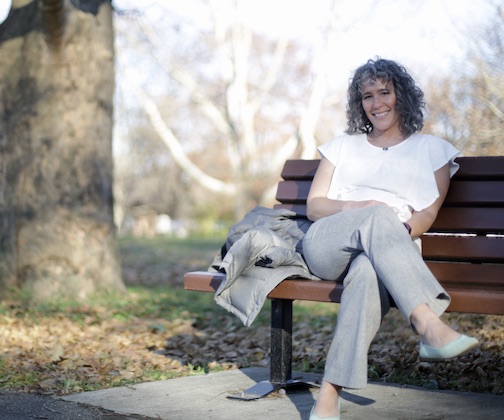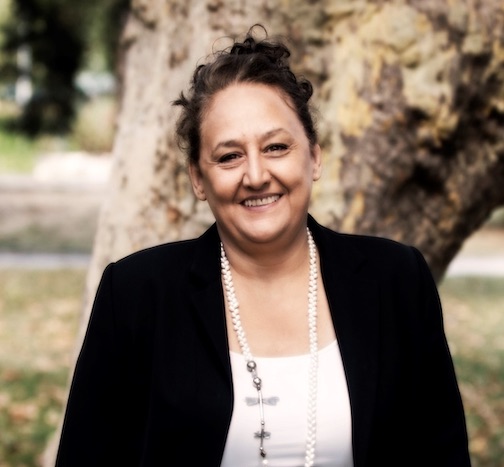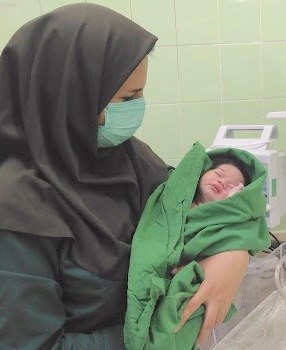Tell us about your background and what got you interested in health and medicine?
I decided to be a midwife because I believe it combines physical and spiritual work. I want to work directly with people in a way that seems to me quite unique: midwifery care, as I’ve experienced it, is intimate, personal, compassionate, supportive, celebratory, active, at times requiring intense involvement and attention, and at other times requiring deep listening and attention. I see it as a job that is in service to the health and well-being of others.
Tell us about your practice and the neighborhood or different locations that you work in.
My name is Farzane, I am 31 years old. I am a midwife and a teacher! I have been working for 5 years in hospital and also, I am teaching midwifery students in Iran. Teaching is a noble profession. I teach graduate students. I love being able to provide a warm and calm environment for a baby to be born into, being able to make connections with people and having them trust me.
How has your routine changed since the pandemic?
New restrictions are in place everywhere. some hospitals have prohibited partners from being present at births and women are discharged much sooner than usual, mere hours after giving birth. One person is still allowed to accompany the woman giving birth.
Midwifery practices and hospitals have enacted many changes to the delivery of perinatal care to prevent the transmission of COVID‐19. The frequency of direct contact between midwives and patients has decreased because of a revised schedule of prenatal visits, limitations on in‐person group prenatal care, and increased use of telehealth.
Hospitals restrict the number of support people and visitors allowed, further isolating laboring and postpartum individuals from their families during an important life event.
Midwives and patients discuss the difficult choices for how to protect the newborn from infection. Behind these changes is a climate of fear in which midwives and patients worry about contracting COVID‐19 and how to protect themselves and their families.
Policy changes in perinatal care delivery during the pandemic can weaken patient autonomy. The patient has the greatest understanding of their questions, fears, concerns, and health care needs and should have the final say in finding the balance between the risks and benefits of a course of action. In ideal circumstances, a shared‐decision‐making model augments the patient's autonomy and ability to achieve optimal health with the guidance and expertise of the midwife. The reduced frequency of prenatal visits and shift to virtual care may compromise the midwife‐patient relationship that enables autonomy and shared decision making.
What do you wish the public knew about what you experience, in your field of health?
Midwifery is a deeply rewarding career in part because it focuses on a “well model” rather than a “sick model” of healthcare. When I have a woman in labor, I sit with her, help her move around, get her up and walk with her hanging on me during contractions, get her in the tub, listening to the baby’s heartbeat. Being able to multitask is a big one. In the birth center, a lot of people think you’re just waiting for the baby to come out.
Being a midwife is about much more than just holding babies – you’re an expert in caring for women during pregnancy, labour and after birth.
It’s very different from other healthcare professions which can be focused on negative experiences. This is about working with women who are changing from woman to mother.
You’ll work with women, their families and other health professionals in a rewarding job where no two days will be the same and through which you’ll become a highly-skilled and sought-after professional.
What is the best part of your day? The hardest?
The best part of my day is when I get to work with diverse people and families in a variety of environments. There are many variables in the journey from pregnancy to labour and birth – no two experiences will be identical. And the hardest part of our job is when things don’t quite go to plan; if baby doesn’t make it, is unwell or is born with genetic problems.
Will Covid-19 change your approach to your work going forward?
The work of midwives changed dramatically. Whereas it remained essential that they provided family-centred care, established good communication with mothers and offered emotional support and stress management, the environment in which midwives had to provide this care progressively changed in order to help prevent the spread of the virus.
Visits are prohibited in almost all countries. They feel that their role is also to provide emotional support for pregnant women, as well as women with newborns, at a time when they are being asked to keep physical contact to a minimum. I find this difficult as I value the face-to-face interactions with women. Instead, they now talk on the phone more often or leave voice messages to maintain contact.
What is the best life/career advice anyone has ever given you?
A well-supported birth or pregnancy can have an amazing transformative effect, and the potential for that to role on into society is huge. How we treat people at birth is very important to how we exist as a society.
Can you recommend one easy, daily self-health practice that can help people get through the day?
Pregnancy is a special time full of excitement and anticipation. But for many expectant mothers, the COVID-19 pandemic has clouded this time with fear, anxiety and uncertainty. Yoga is a great option because it combines strength training and mindfulness to work the body and ease stress. search for yoga and other antenatal preparation for childbirth online courses, speak with your midwife and relax.
Is there anything else you’d like the public to know about how it feels to be a health practitioner in the middle of a global pandemic?
There’s far more to midwifery than managing the messy miracle of childbirth. It’s a diverse and challenging career that’s all about forging connections, building trust and multitasking. We all try to support pregnant women during pandemic and give them love and security.
More Stories from Kinnected

At times, it has been really frustrating to be a strategist and health communication professional and witness the lack of strategic planning and messaging that we have over the last two years.
-
4 years ago

"What many people miss is that emotional exhaustion among clinicians existed long before the pandemic."
-
4 years ago

"A lot of people argue whether technology is good for the future of humanity or bad. In my opinion, it is both - just as an herb could be a poison or a medicine."
-
4 years ago

